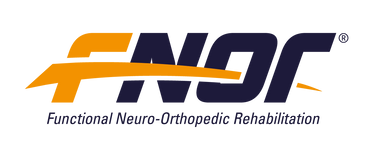FNOR 4: Integrative Rehabilitation of Complex, Multi-System Injury (incl. Concussion and Neuropathic Pain)

BACKGROUND:
"Lesions or diseases involving the somatosensory nervous system may paradoxically not only lead to a loss of function but also to increased pain sensitivity and spontaneous pain." - Scholz et al (2019)(Pain)
"An emerging area of research has identified that an increased risk of musculoskeletal injury may exist upon returning to sports after a sport-related concussion." - Howell et al (2018) (Sports Med)

An Intensive, 3-Day, 25-hour, Practical Course for Rehabilitation Specialists (Live Stream Format)
COURSE DESCRIPTION
This information presented in this course can be applied to almost every presentation that the physical rehabilitation specialist might confront in clinical practice as it deals with the nervous system's response to physical injury and direct insult.
This course emphasizes the relationship between cognitive, emotional, and behavioral networks and their relationship with other important systems in the brain, including sensory, autonomic, vestibular and motor systems, and how the interaction between these systems can promote persistent, “mysterious”, debilitating symptoms.
While this course offers a rational framework, providing a “place to start” in almost any clinical presentation, an emphasis is placed on addressing underlying neurophysiologic processes rather than only following a prescribed, condition-based protocol. This provides the therapist with a sense of “knowing what to do” if it seems like your client is “hitting a wall” in therapy.
Following this application-based overview, course attendees are provided with a neuroscience-based foundation from which to appreciate the topic of concussion.
NOR 4 provides an up-to-date overview of international guidelines on concussion management as well as the current evidence surrounding pathophysiology and biomechanical forces acting on the brain during a concussion injury. The course will also present a rational, evidence-based approach to the clinical management of Concussion and Persistent Concussion Symptoms.
TOPICS COVERED IN THIS COURSE
- Changes in Brain Networks following Trauma
- Neurophysiology of Emotion, Cognition, and Behavior in Pain and Multi-System Injury
- Management of Cognitive and Behavioral Drivers of Persistent Symptoms
- Pathophysiology of Neuropathic Pain
- Application of the NOR matrix in Case Management
- Integrative Management of Complex Pain Syndromes
- Pathophysiology of Acute Concussion
- Concussion and Autonomic Dysfunction
- Pathophysiology of Post-Concussion Syndrome
- Assessment of Post-Concussion Syndrome
- Management Strategies and Techniques
WHO IS THIS COURSE FOR?:
As with every Neuro-Orthopedic Rehabilitation (NOR) course, this course is open to healthcare providers of any occupational background. In fact, NOR 4 is likely to benefit any practitioner who deals with injured or suffering clients.
That said, the course is designed for physical rehabilitation-based practitioners, especially physical therapists (physiotherapists), chiropractors, athletic trainers, nurses involved in rehabilitation, and medical physiatrists.
NOR courses are open to health and healing professionals from all disciplines.
WHAT YOU WILL GET OUT THIS COURSE:
- A New Set of Treatment Options:
When faced with complex symptoms and persistent pain, many practitioners are often compelled to “guess” as they throw known techniques at “unknown” symptoms. This course will provide an expanded perspective of how trauma of various kinds affects the brain and nervous system and how to use a patient-centered, integrative rehabilitative approach to resolve complex, persistent symptoms, including persistent, neuropathic pain.
- A Well-rounded Framework for the Management of Persistent Pain:
This 4th course in the FNOR program rounds off the NOR matrix, forming a practical and effective framework for delivery of integrative, physical rehabilitation. Using the matrix, pain rehabilitation is more structured, rational, and overall more effective.
- A place to start when confronted with “mysterious” symptoms:
When the client’s suffering persists after an initial injury (incl. head injury, metabolic challenge, or traumatic event), it can be difficult to isolate the cause of persistent issues. This course (especially in conjunction with the first 3 NOR courses), provides a range of entry points and directions in terms of case management in the client suffering from complex symptoms and unresolved injury. This course will help you get your clients “un-stuck” from persistent symptomatic states.
- An evidence-based approach to the management of post-concussion symptoms:
This course offers a rational approach to the management of post-concussion symptoms (PCS), based on current guidelines.
- How to use the advantages of the Physical Rehabilitative Environment toward effecting behavioral change:
While behavioral components of persistent symptoms can be a challenge for physical rehabilitation specialists, from the NOR perspective, the physical rehabilitation environment actually holds a number of leverageable advantages that can be harnessed to make effective changes in behavioral processes, which can positively affect management of persistent symptoms and disability.
- Reduced Practice Drag and Burnout:
Dealing with Pain and Suffering is a “sticky” process! Understanding the processes presented in NOR 4 will make your practice more flexible and adaptive, with respect to meeting the needs of each client, and will also provide tools to reduce burnout.
Please check the Course Calendar for NOR 4 dates.
WHO IS THE PROGRAM INTENDED FOR?
(Licensed Professional (and current students) in the following professions are welcome to attend: DPT, PT, PTA, MD, DC, DO, RN, MSN, ATC)
The program will likely be highly valuable for any experienced rehabilitation specialist seeking to update their rehabilitation system as well as for recent grads seeking to learn a practical framework from which to launch their own successful rehabilitation program.
Practitioners proficient in many contemporary approaches to pain, orthopedic rehabilitation and sports injury will likely find the FNOR approach very flexible and compatible with their current clinical approach.
TUITION:
- The base rate for this course (as with each of the 3-day, 25 hour, FNOR modules) is $1,250 (US). An early bird registration rate of $1050 is offered for registrations made 60 days ahead.
